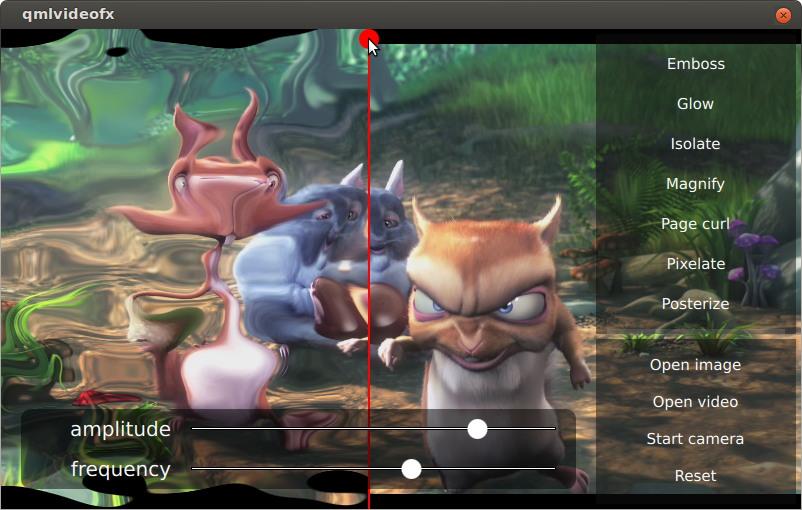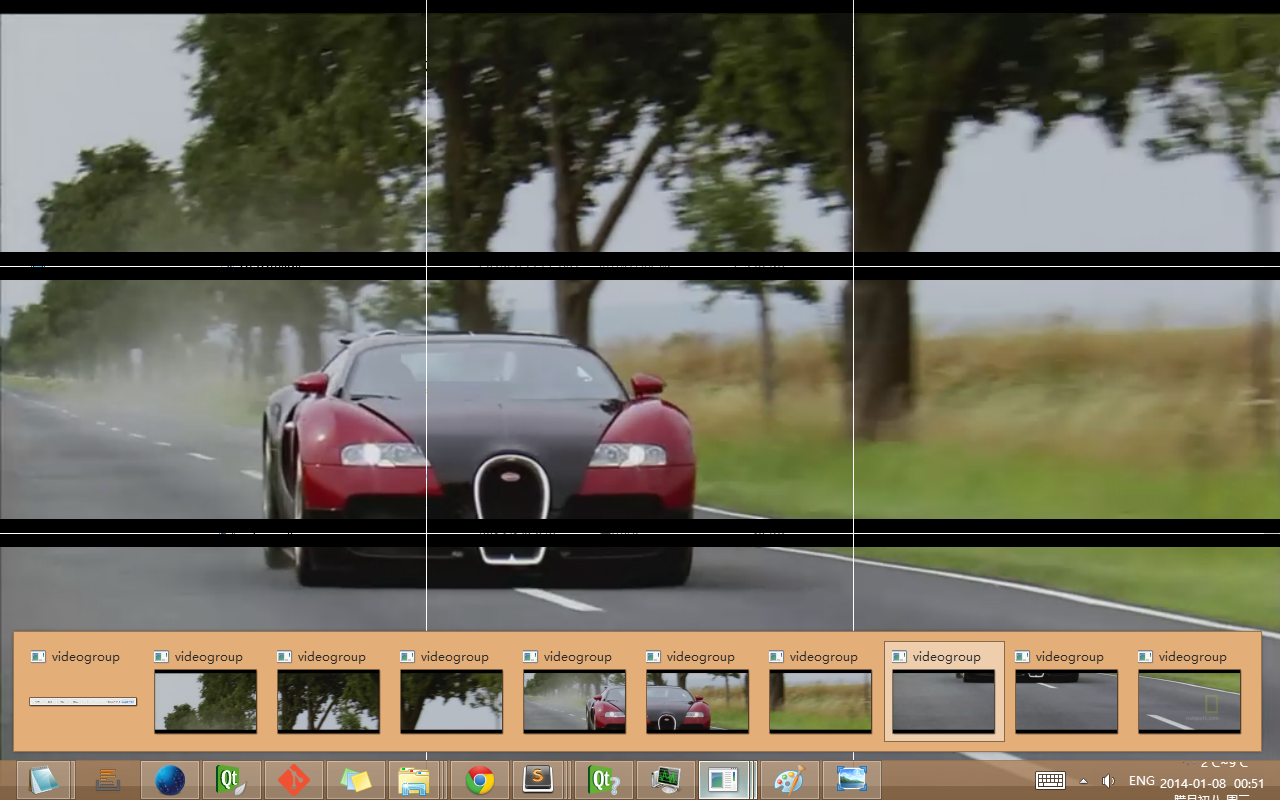QtAV is a multimedia playback library based on Qt and FFmpeg. It can help you to write a player with less effort than ever before.
QtAV has been added to FFmpeg projects page http://ffmpeg.org/projects.html
QtAV is free software licensed under the term of LGPL v2.1. The player example is licensed under GPL v3. If you use QtAV or its constituent libraries, you must adhere to the terms of the license in question.
QtAV can meet your most demands
- Hardware decoding suppprt: DXVA2, VAAPI, CedarX, CUDA(the 1st player support CUDA on linux?)
- OpenGL and ES2 support for Hi10P and other 16-bit YUV videos (The 1st player/library support in ES2? VLC, XBMC, mplayer does not support now)
- Seek, pause/resume
- Video capture in rgb and yuv format
- OSD and custom filters
- Transform video using GraphicsItemRenderer. (rotate, shear, etc)
- Playing frame by frame (currently support forward playing)
- Playing speed control. At any speed.
- Variant streams: locale file, http, rtsp, etc.
- Choose audio channel
- Choose media stream, e.g. play a desired audio track
- Multiple render engine support. Currently supports QPainter, GDI+, Direct2D, XV and OpenGL(and ES2).
- Dynamically change render engine when playing.
- Multiple video outputs for 1 player
- Region of interest(ROI), i.e. video cropping
- Video eq: brightness, contrast, saturation, hue
- QML support as a plugin. Most playback APIs are compatible with QtMultiMedia module
- Compatiblity: QtAV can be built with both Qt4 and Qt5. QtAV supports both FFmpeg(>=0.9) and Libav >= 9.0.
QtAV currently uses FFmpeg to decode video, convert image and audio data, and uses PortAudio to play sound. Every part in QtAV is designed to be extensible. For example, you can write your decoder, audio output for particular platform. Here is a very good example to add cedar hardware accelerated decoder for A13-OLinuXino
- FFmpeg (>=0.9)Latest version is recommanded.
or Libav (>=0.9) Latest version is recommanded.
The required development files for MinGW can be found in sourceforge page: depends
See the wiki Build QtAV and QtAV Build Configurations
Wrtie a media player using QtAV is quite easy.
GLWidgetRenderer renderer;
renderer.show();
AVPlayer player;
player.setRenderer(&renderer);
player.play("test.avi");
For more detail to using QtAV, see the wiki Use QtAV In Your Project or examples.
QtAV can also be used in Qml
import QtQuick 2.0
import QtAV 1.3
Item {
VideoOutput {
anchors.fill: parent
source: player
}
AVPlayer { //or MediaPlayer
id: player
source: "test.mp4"
}
MouseArea {
anchors.fill: parent
onClicked: player.play()
}
}
- Fork QtAV project on github and make a branch. Commit in that branch, and push, then create a pull request to be reviewed and merged.
- Create an issue if you have any problem when using QtAV or you find a bug, etc.
- What you can do: translation, write document, wiki, find or fix bugs, give your idea for this project etc.
- Wang Bin(Lucas Wang) wbsecg1@gmail.com: creator, maintainer
- skaman: aspect ratio from stream
- Stefan Ladage sladage@gmail.com: QIODevice support. Wiki about build QtAV for iOS.
- Miroslav Bendik miroslav.bendik@gmail.com: Cedarv support. Better qmlvideofx appearance
- Dimitri E. Prado dprado@e3c.com.br: issue 70
- theoribeiro theo@fictix.com.br: initial QML support
- Vito Covito vito.covito@selcomsrl.eu: interrupt callback
An simple player can be found in examples. The command line options is
player [-ao null] [-vo qt|gl|d2d|gdi|xv] [-vd "dxva[cuda[;vaapi[;ffmpeg]]]"] [--ffmpeg-log] [url|path|pipe:]
To disable audio output, add -ao null
Choose a render engine with -vo option(default is OpenGL). For example, in windows that support Direct2D, you can run
player -vo d2d filename
To select decoder, use -vd option. Value can be dxva, vaapi and ffmpeg, or a list separated by ; in priority order. For example:
player -vd "dxva;ffmpeg" filename
will use dxva if dxva can decode, otherwise ffmpeg will be used.
QMLPlayer has less options now. To use DXVA decoder:
QMLPlayer-vd "DXVA;FFmpeg" filename
- Double click: fullscreen switch
- Ctrl+O: open a file
- Space: pause/continue
- F: fullscreen on/off
- I: switch display quality
- T: stays on top on/off
- N: show next frame. Continue the playing by pressing "Space"
- O: OSD
- P: replay
- Q/ESC: quit
- S: stop
- R: switch aspect ratio
- M: mute on/off
- Up / Down: volume + / -
- Ctrl+Up/Down: speed + / -
- -> / <-: seek forward / backward
- Crtl+Wheel: zoom in/out
- Drag and drop a media file to player
Read https://github.com/wang-bin/QtAV/wiki/TODO for detail.
Use QtAV in QML with OpenGL shaders(example is from qtmultimedia. But qtmultimedia is replaced by QtAV)
QtAV on Mac OS X
QMLPlayer on ubuntu
Video Wall
软件由我一人利用空余学习和工作时间开发。如果您觉得不错,可以考虑资助一下
#####What are the financial needs of QtAV?
- Buy hardware for developing and testing purpose. (lack of AMD card now)
Thanks
Now I have received 1150 RMB and 100$
Copyright © Wang Bin wbsecg1@gmail.com
Shanghai University->S3 Graphics, Shanghai, China
2013-01-21












